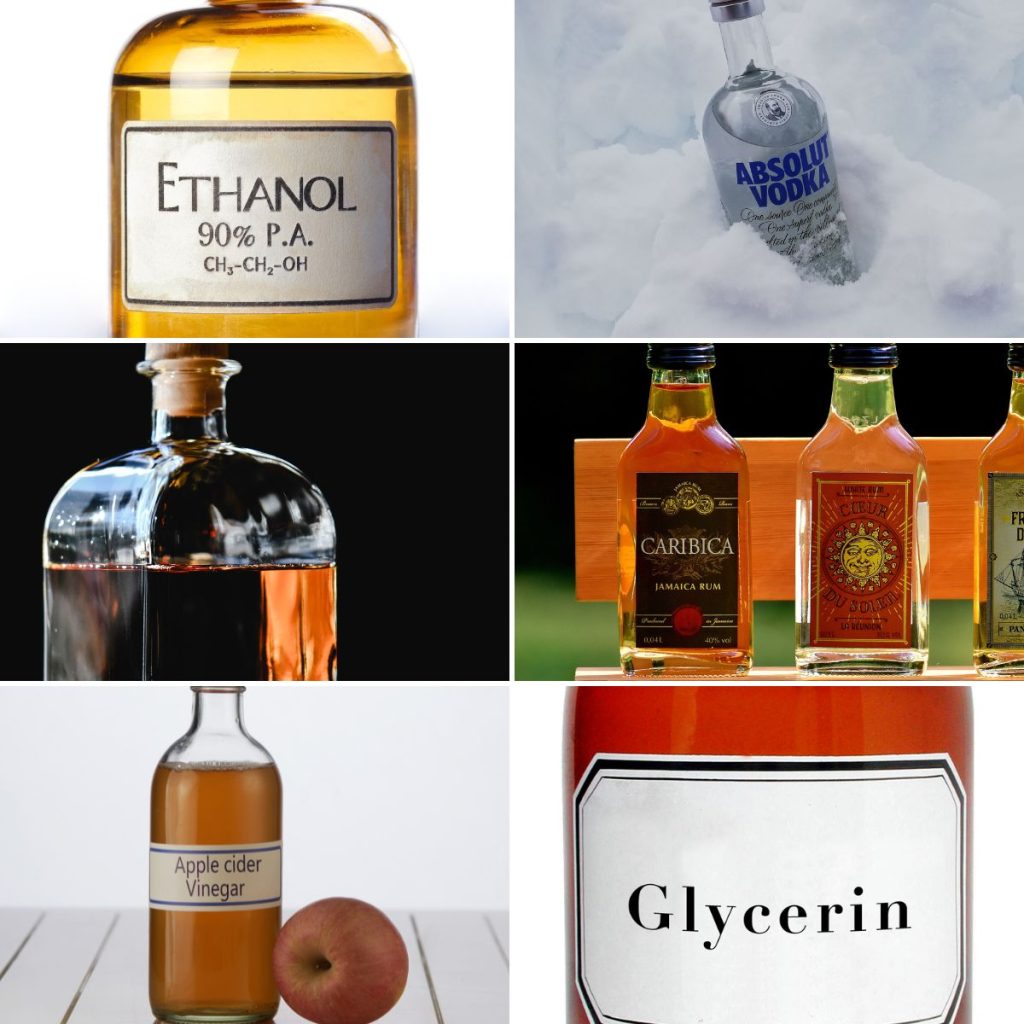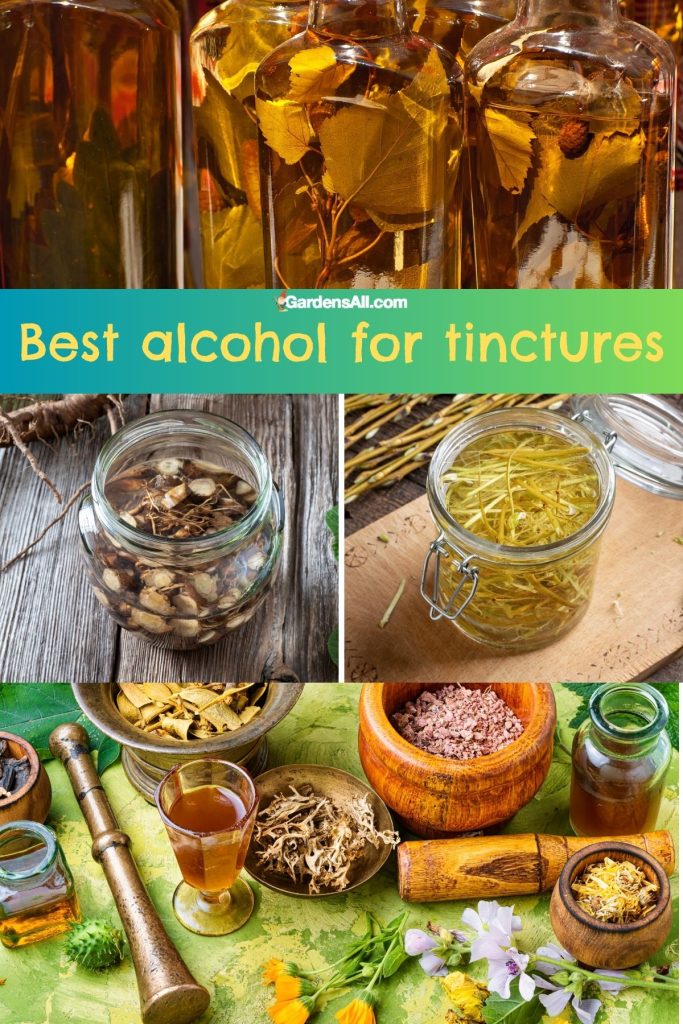What is Grain Alcohol?
If you’re preserving your precious herbs, you’ll want to know the best alcohol for tinctures.
Grain alcohol is typically called “Ethanol” or “Ethyl Alcohol” in a scientific context. However, in a commercial context, especially in the United States, the most commonly known brand name for grain alcohol is “Everclear.”
Everclear is known for its very high alcohol content, typically available in 151 proof (75.5% alcohol by volume) and 190 proof (95% alcohol by volume) versions. It’s often used in tincture making due to its high alcohol concentration, which makes it very efficient at extracting the active compounds from herbs.
However, due to its potency, some dilute it with water or other liquids when using for herbal tinctures.
If you’re new to making tinctures, check out our article on how to make tinctures from herbs and plants.
Chart of Preservative Mediums for Tinctures
| Preservative Medium | Alcohol % | Proof |
|---|---|---|
| Vodka | 40-50% | 80-100 |
| Brandy | 35-60% | 70-120 |
| Rum | 40-75% | 80-150 |
| Grain Alcohol (aka Ethanol and Everclear) | 75-95% | 150-190 |
| Glycerin (non-alcohol alternative) | 0% | 0 |
| Apple Cider Vinegar (non-alcohol alternative) | 5-6% | 10-12 |

Herbal Tincture Preservative Mediums
- Grain Alcohol: Food grade ethanol, aka, Grain alcohol is very high in alcohol content, ranging from 75-95% (150-190 proof). It’s extremely efficient at extracting active compounds but can be too potent and harsh for some herbs and users. It’s often diluted before use.
- Apple Cider Vinegar: Another non-alcoholic option, apple cider vinegar has about 5-6% alcohol (10-12 proof). It’s less efficient than alcohol but is a good choice for making nutrient-rich, mild tinctures, and is particularly popular in wellness and culinary uses.
- Brandy: Brandy, with its 35-60% alcohol content (70-120 proof), adds a slightly sweet flavor to tinctures. It’s often used for tinctures that benefit from its unique taste profile.
- Peach brandy: “I find it a little better than vodka for palatability.” ~Carmel Ann Callan
- Apple pie brandy: “I make a sleep tincture using apple pie moonshine. It softens the taste.” ~Becky Reed*
- Slivoviotz plum brandy, favored by Debie Baugher.
- Glycerin: Glycerin is a non-alcoholic alternative, often used for children or those avoiding alcohol. While it does not extract certain compounds as effectively as alcohol, it is a good solvent for a wide range of herbs and has a sweet taste.
- Rum: Rum can vary significantly in alcohol content, usually between 40-75% (80-150 proof). Its sweetness and flavor profile make it suitable for certain herbal extracts, particularly those used in culinary preparations.
- Vodka: Vodka is a popular choice for tinctures due to its neutral flavor. It typically contains 40-50% alcohol (80-100 proof), making it effective at extracting a wide range of herbal constituents without any overpowering flavor detracting from the herbal flavor.
Readers Favorites:- Potato vodka
- Sugar cane vodka
- Whiskey: A number of our readers choose moonshine for their tinctures.
Each type of alcohol offers unique properties for tincture making. The choice depends on the intended use of the tincture, the herbs being used, and personal preferences or requirements (such as avoiding alcohol).
Reader’s Comments
*We asked Becky Reed about her sleep tincture, and here’s what she said:
I buy the apple pie brandy from Total Wine. I’ve made a couple different tinctures. I usually include passion flower foliage to help stop circular thinking, lemon grass, chaste berries to help with night sweats, valerian sometimes but I hate the taste, kava kava, ashwaganda, lemon balm, catnip and chamomile.
Regarding the potential bitter taste of vodka, Debie Baugher said this:
“Run the vodka through a Brita water filter pitcher. It’ll taste amazing after that. That’s what I use when I make tinctures.“
Organic Alcohol for Tinctures
For making tinctures using organic alcohol, there are several options available, each offering unique benefits in terms of purity, environmental impact, and suitability for different types of tinctures:
- Extractohol: They offer two primary types of organic alcohol:
- Organic Alcohol (200-proof) made from certified organic sugarcane, suitable for robust extraction.
- Organic Alcohol for Tinctures (190-proof), ideal for a slightly gentler approach in tincture-making. Extractohol’s products are designed specifically for tincture-making, ensuring high purity and effectiveness.
- Culinary Solvent: They provide USDA Certified organic alcohol, known as organic non-denatured food-grade ethanol. This ethyl alcohol is produced with non-GMO, pesticide-free ingredients and sustainable methods. It’s free from synthetic additives, catering to health and environmentally conscious needs. Their product range includes various organic alcohols made from raw materials like grains and sugarcane, grown without synthetic pesticides, herbicides, or fertilizers, and are non-GMO.
- Lab Alley: They offer USDA Certified Organic Cane Alcohol 190 Proof, which is 95% ethyl alcohol made from certified organic sugarcane grown without pesticides. This alcohol is used as a high-quality extraction agent for herbal tinctures, tonics, and elixirs. It’s also suitable for use in perfumes, skincare products, and cosmetic preparations.
- Organic Alcohol Company: Based in Ashland, Oregon, this company offers a variety of organic, non-GMO, gluten-free, and vegan high-quality pure spirits. Their product lineup includes organic alcohol made from corn, grape, wheat, and cane in both 190-proof and 200-proof versions. They also provide craft-grade organic alcohol made from unique sources like coconut, lychee, and pear.
Each of these suppliers offers organic alcohol that is suitable for tincture making, with a focus on purity, environmental responsibility, and compliance with stringent organic standards. Depending on your specific needs and preferences, any of these options could be a good choice for crafting high-quality organic tinctures.
What Tinctures Work Best With Brandy as a Preservative Medium?
Brandy, with its distinct flavor profile, can be particularly beneficial for certain types of tinctures. Here’s a bullet list highlighting which tinctures might benefit most from brandy’s distinct flavor.
- Herbs with Bitter or Astringent Flavors: Brandy’s natural sweetness can help mask or balance the bitterness or astringency of certain herbs, making the tincture more palatable. Examples include dandelion root or yarrow.
- Culinary Tinctures: Herbs that are used in cooking and pair well with sweet or fruity flavors can benefit from brandy’s profile. Examples include vanilla, cinnamon, or citrus peel tinctures.
- Relaxation or Sleep Formulas: Herbs that are used to promote relaxation or sleep may be complemented by the warm, soothing qualities of brandy. Examples include chamomile, lavender, or valerian root.
- Tinctures for Digestive Support: Brandy can enhance tinctures that are intended to aid digestion, as its warming properties can be beneficial. Herbs like ginger, fennel, or peppermint could be good candidates.
- Tinctures with a Festive or Seasonal Appeal: Herbs that are often used in seasonal or festive remedies, such as those used during the winter holidays, can be nicely complemented by the rich, warm tones of brandy. Examples include clove, nutmeg, or elderberry.
In each of these cases, brandy not only acts as a solvent but also adds its own character to the tincture, potentially enhancing the overall sensory experience and effectiveness of the herbal remedy.
Alcohol % and Proof Explained
- Alcohol % (Percentage by Volume): This indicates the percentage of alcohol in the liquid. For example, a 40% alcohol by volume means 40% of the liquid is alcohol, and the rest is water and other components.
- Proof: This is a measure of the strength of the alcohol. In the United States, the proof is double the alcohol percentage. For instance, 50% alcohol by volume is 100 proof. Proof is an older term but still widely used, especially in spirits.
What is Ethanol?
Grain alcohol is typically called “Ethanol” or “Ethyl Alcohol” in a scientific context. However, in a commercial context, especially in the United States, the most commonly known brand name for grain alcohol is “Everclear.”
Everclear is known for its very high alcohol content, typically available in 151 proof (75.5% alcohol by volume) and 190 proof (95% alcohol by volume) versions. It’s often used in tincture making due to its high alcohol concentration, which makes it very efficient at extracting the active compounds from herbs.
However, due to its potency, it’s also commonly diluted with water or other liquids when used for this purpose.
Will Diluting Water to Grain Alcohol Compromise Efficacy?
Adding water to grain alcohol can affect the longevity and preservation ability of a tincture, but this depends on several factors:
- Alcohol Concentration: The primary function of alcohol in tinctures is to extract active compounds from plants and preserve them. Most tinctures are effective with an alcohol concentration of 40-60%. If the dilution with water drops the alcohol concentration below this range, it may reduce the tincture’s ability to effectively preserve the plant matter and extract its beneficial compounds.
- Type of Plant Matter: Some herbs require higher alcohol concentrations for effective extraction of their active constituents. In these cases, diluting grain alcohol might compromise the tincture’s quality. However, for many herbs, a moderate alcohol concentration (achieved by diluting grain alcohol) is sufficient.
- Shelf Life: Higher alcohol concentrations generally offer a longer shelf life because alcohol is a preservative. Diluting grain alcohol with water might shorten the shelf life of the tincture compared to using undiluted grain alcohol. However, as long as the final alcohol concentration remains above 20%, the tincture should still have a good shelf life, though perhaps not as long as a higher-alcohol tincture.
- Risk of Herb Degradation: Some delicate compounds in herbs can be degraded by very high alcohol concentrations. In such cases, diluting grain alcohol can actually be beneficial, as it can make the extraction process gentler and preserve these delicate compounds.
- Safety and Palatability: High-proof alcohol like grain alcohol can be harsh and potentially unsafe for direct consumption. Diluting it can make the tincture more palatable and safer for use, especially when taken orally.
So while diluting grain alcohol may slightly reduce its preservation power, it can be beneficial for extracting certain types of compounds. Light dilution may improve safety and palatability, and is often necessary to achieve the desired balance in a tincture.
The key is to maintain an adequate alcohol concentration that is suitable for the type of herbs being used and the intended use of the tincture.

I’m LeAura Alderson, a garden, herb and plant enthusiast with a passion for discovering the many edible and medicinal benefits of the plants all around us, including the weeds! I’m a writer, editor and media publisher for our family of websites.
While I was certified in fitness and life coaching, I am NOT a health practitioner. However, I’m a lifelong health enthusiast, with a keen interest in healthy, organic foods and making home remedies and the content we share is from our own experience and usage as well as that extracted from scientific research so that you can explore further on your own.
Always seek the advice and guidance of your health practitioners first and foremost.
As a family we’re steadily expanding our gardening, experimentation and knowledge around all things gardening, edible landscaping, fresh organic foods and self sustainability with farming in our future. I also own and manage iCreateDaily.com, a site all about transformation through creation, and the power of positivity, optimism and mindset.

